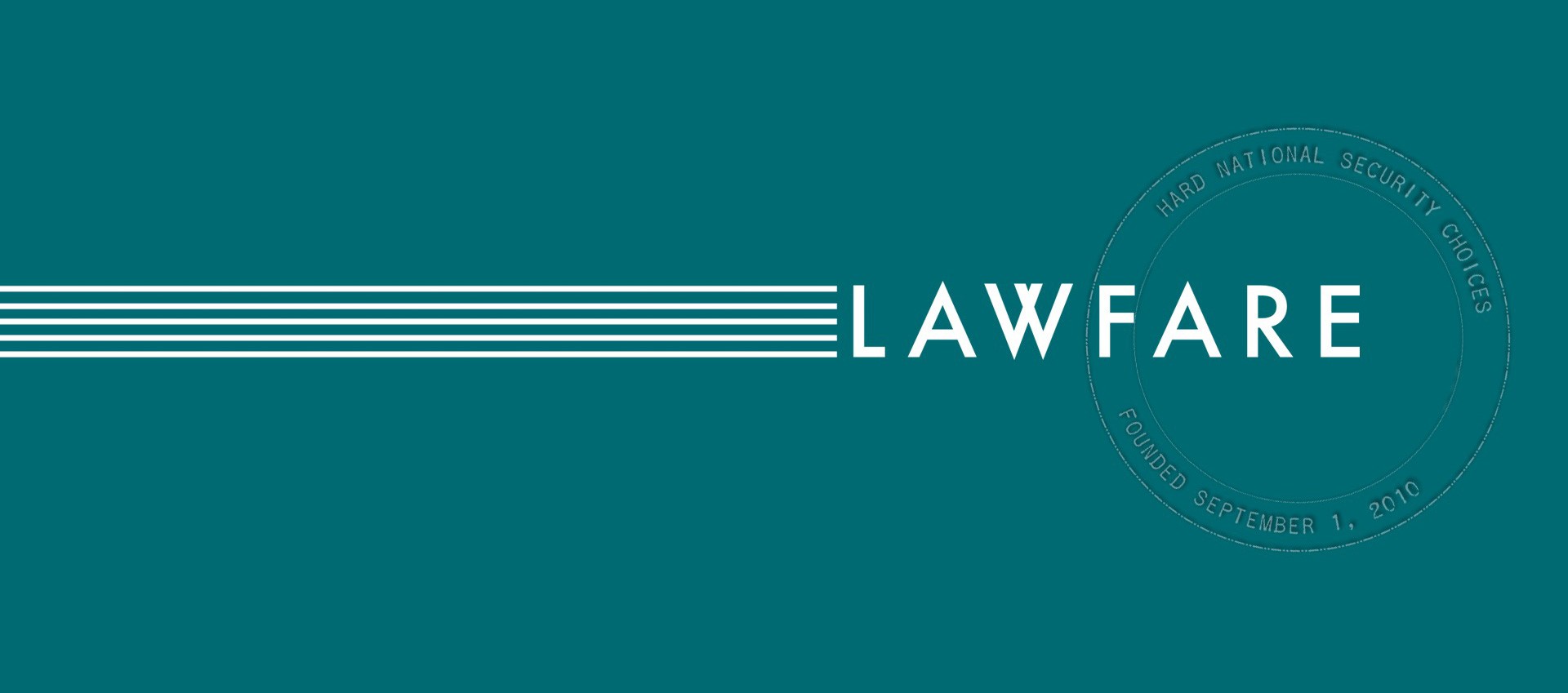The Week That Was: All of Lawfare in One Post
Your weekly summary of everything on the site.

Published by The Lawfare Institute
in Cooperation With

Anna Bower, Tyler McBrien, Katherine Pompilio, and Benjamin Wittes reported on Michael Cohen’s two-day testimony against former President Donald Trump in the New York hush money criminal trial.
Bower, McBrien, Pompilio, and Wittes reported on the end of Stormy Daniels’s testimony, Rebecca Manochio and Madeleine Westerhout taking the stand, and a denied motion for a mistrial.
On May 16, Roger Parloff spoke to Bower, McBrien, and Wittes for Lawfare’s post-court dispatch. If you couldn't attend the live event, the recording is available on Lawfare’s YouTube channel or later on the Lawfare Podcast feed. You can also watch all other post-court dispatches here:
On Lawfare Daily, Wittes talked to Parloff, McBrien, and Bower about the lack of action in Fulton County, the Southern District of Florida and D.C. They then took a deep dive into the New York City Trump trial, looked ahead to whether there are witnesses left in the case, and more:
Also on Lawfare Daily, Natalie Orpett sat down with Quinta Jurecic to discuss "the fraudulent electors scheme," which was one of the attempts to overturn the results of the 2020 election by using the Electoral College process. They talked about Jurecic’s recent article explaining what happened to the fake electors, whether there have been any state-level prosecutions, and more:
On Rational Security, Scott R. Anderson, Jurecic, and Alan Z. Rozenshtein were joined by Orpett to go over the week’s big national security news. They discussed a long-awaited report from the Biden administration that concluded that Israel may have violated international law and obstructed U.S.-backed humanitarian flow in Gaza, what the sharp global decline in birth rate in highly developed countries means for national security, the Justice Department’s indictment of a second Democratic legislator for working as an unregistered agent of a foreign government, and more:
Eugenia Lostri sat down with Adam Segal to discuss the U.S. State Department’s new U.S. International Cyberspace and Digital Policy Strategy. They talked about how the strategy fits with other cyber actions from the Biden administration, what the principle of digital solidarity looks like in practice, and more.
Rozenshtein considered the First Amendment implications of the recent lawsuits filed by TikTok and some of its users, challenging the Protecting Americans from Foreign Adversary Controlled Applications Act (PAFACAA)—which threatens to ban the app from being used in the U.S. if Chinese ownership doesn’t divest.
TikTok argued in its lawsuit against the U.S. government that the PAFACAA—which aims to prohibit app stores from updating or distributing TikTok—unconstitutionally targets the company. Evan C. Zoldan examined the constitutionality of legislative targeting and asserted that the Supreme Court should consider clarifying the issue.
Cedric Sabbah explained how framework interoperability—the ability of different frameworks to coexist and communicate with one another to reduce regulatory friction between jurisdictions—can be harnessed to balance global digital integration and regulatory autonomy.
In the latest installment of Lawfare’s Security by Design paper series, Steven B. Lipner explained how alternative measures—such as process transparency, vendor attestation, and Executive Order 14028—could lead to greater improvements in software security, as opposed to a liability regime.
In another installment of Lawfare’s Security by Design paper series, Daniel Woods proposed the establishment of pro-subrogation policy in the software liability regime to strengthen accountability.
On Lawfare Daily, Stephanie Pell sat down with Gavin Wilde and Emma Landi to talk about their new paper exploring law enforcement efforts to “hack the hackers” in the fight against cyber crime. They talked about the types of hacking operations performed by law enforcement, when law enforcement may be better suited to address the actions of malicious cyber actors as compared with the military and private sector, and more:
Ido Kilovaty explained why artificial intelligence manipulation, specifically prompt injection, should be considered “access without authorization” under the Computer Fraud and Abuse Act, and is therefore a cybercrime.
Diane Bernabei, James Baker, and Cosimo L. Fabrizio examined the emerging importance of compute governance in artificial intelligence (AI) regulation. They discussed the challenges of domestic and international compute governance and what is required to overcome the legal obstacles and issues regarding implementation.
On Lawfare Daily, Lostri spoke with Pablo Chavez about the recently released International Cyberspace and Digital Strategy which focuses on building digital solidarity as an alternative to digital sovereignty policies. They talked about the range of policies that can fall under the digital sovereignty category, how digital solidarity offers an alternative position, and more:
In the latest edition of the Seriously Risky Business cybersecurity newsletter, Tom Uren discussed an Amnesty International report on the impact of spyware use in Indonesia on civil and human rights, how American hospitals are pushing back against the government for their attempt to enhance cybersecurity measures following the recent Change Healthcare ransomware attack, and more.
In this week’s installment of Lawfare’s Foreign Policy Essay series, Kim Cragin examined the key differences between Hamas and al-Qaeda—including their nationalistic views, participation in political systems, majority audience—and why traditional counterterrorism measures will not work to eradicate Hamas.
Maya Nicholson shared a transcript of Israel’s oral argument before the International Court of Justice, in the case of South Africa v. Israel.
On Chatter, David Priess sat down with Gaia Vince to discuss climate change-driven mass migration and how it will be increasing given the population shifts predicted in the coming century. They talked about perceptions of borders across history, attitudes toward climate change mitigation vs. adaptation, why the “Dubai model” isn't a global solution, demographic shifts in the global north, and more:
Gavin Wilde reviewed Peter Pomertantsev’s “How to Win an Information War: The Propagandist Who Outwitted Hitler.” Wilde characterized Pomerantatsev’s book as an “addictive page-turner” that provokes philosophical questions regarding the role of propaganda in politics and war and illustrates Sefton Delmer’s story of World War II while comparing it to contemporary Russia.
On April 3, Lawfare announced another auction item on the Givebutter campaign—the “Black Hole of Awful” Post-It by Jurecic, one-of-a-kind Lawfare sketch born from a conversation with Wittes that illustrates the extent to which trial delay is advantageous to Trump. Another piece of exclusive Lawfare merchandise up for auction is Wittes’s Twitter sensation and protector of democracy #BabyCannon. Place your bids to support Lawfare’s Trump Trials coverage. You can also support Lawfare’s Trump Trials coverage by making a contribution here.
And Lawfare is hiring! We are accepting applications for a new full-time associate editor based in Washington, D.C. Associate editors play a pivotal role in Lawfare’s coverage. The application deadline is May 20. Applications will be reviewed on a rolling basis.
And that was the week that was.



